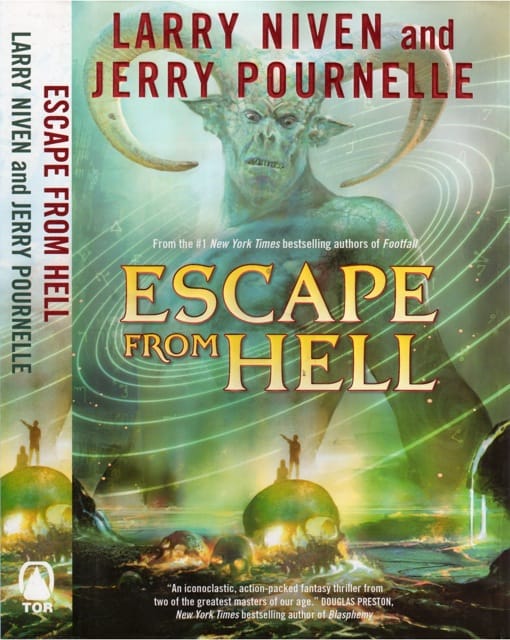The Long View 2005-09-07: The Wicked City

John Reilly didn't find the idea that New Orleans had been punished for its sins particularly compelling.
The Wicked City
We admire Mark Steyn in part because he so rarely has to take back his numerous predictions. For Katrina, however, he was forced to make an exception:
What the hell was I thinking?
For some reason, I failed to consider the possibility that the panickers would include Hizzoner the Mayor and the looters would include significant numbers of the police department...My mistake was to think that the citizenry of the Big Easy would rise to the great rallying cry of Todd Beamer: "Are you ready, guys? Let's roll!"...Unlike 9/11, when the cult of victimhood was temporarily suspended in honour of the many real, actual victims under the rubble, in New Orleans everyone claimed the mantle of victim, from the incompetent mayor to the "oppressed" guys wading through the water with new DVD players under each arm.
This is likely to become the consensus view: the disaster was essentially a "riot." Note that this will in no way exonerate government in the public mind. The authorities at every level are routinely blamed for riots: not for "root causes," but for failure to keep order. The only question is how much of the blame will be seen as local, and how much as federal. Many of the criticisms of the federal government in general and of President Bush in particular have been opportunistic, but that does not mean they are wholly lacking in merit.
* * *
Speaking of opportunism, Spengler at Asia Times has taken the opportunity of the deluge to entitle a column Deep in denial (or in de' Mississippi), while actually reviewing two books on a quite different subject: The Fall of Rome and the End of Civilization by Bryan Ward-Perkins, and The Fall of the Roman Empire: A New History by Peter Heather. Straining mightily, Spengler attempts to make these connections between ancient and current events:
Katrina destroyed the city, just as the Huns' invasion of 376 AD destroyed the Western Roman Empire; but Rome had spent centuries digging its own grave, just as the levee builders on the Mississippi had spent decades with New Orleans... I tend to credit the old-fashioned view, unpopular in the academy, that infertility due to infanticide, contraception, promiscuity and general immorality rotted out Rome long before it collapsed.
Possibly I am misinformed, but I believe that the empire was on a pretty steady course of moral rearmament after the fall of the batty Julio-Claudian dynasty in the first century.
* * *
The longest-term look at the future of New Orleans appears in a short novel by Poul Anderson, The Winter of the World, which was published in 1975. The story is set around AD 14,000 (we know this because Vega is the pole star), during an ice age. A city on the precise site of New Orleans, but called Arvanneth, is the seat of a civilization so old that it has long since gone to seed, but is not quite so old as to have any direct connection with today's civilization. In the book, the city's latest semi-barbarian conqueror deals tactfully with this representative of the incumbent theocracy:
Sidir thought of him in prosaic Barommian, as the city-state's head of civil affairs. That made Ercer the last of the lords spiritual who had anything real to do. As for the Holy Councilor of the Godhood, religious matters in Arvanneth had long ceased to be much more than intrigues between the Temples. The mass of the population was sunken in superstition and corruptions of faith, or in unbelief, or in the worship of strange gods. As for the Holy Councilor of the Woe, conquest by the Empire had removed responsibility for military business and had left him simply a courtesy title.
Flooding is not so urgent a danger in this future, since sea level has fallen substantially. In general, though, Arvanneth's municipal government seems more on the ball than Mayor Nagin's.
* * *
A note on theodicy: It is difficult to argue that New Orleans was punished for its wickedness. The city had long had a reputation as the place where the devil goes on vacation; there is no obvious reason why God should find it more intolerable now than formerly. Perhaps reassured by this analysis, the state legislature of California became the the first in the nation yesterday to redefine marriage to include homosexual couples.
This presents a difficult issue for Governor Schwarzenegger. He is little loved by social conservatives, so he might be tempted to gain a measure of credit with them by vetoing the bill. On the other hand, he will never be the social conservative's candidate, no matter what he does in this matter. He has taken the novel position that what he does should not be irrelevant: he says this is not a matter for the legislature or the governor, but for the people and the courts. One is reminded of Fareed Zakaria's suggestion that the California legislature is too unrepresentative to be trusted with the people's business.
In any case, it is in fact likely that gay marriage in California would quickly be abolished by referendum. Governor Schwarzenegger would probably do least harm to his political prospects by vetoing the bill. In that way, he would at least avoid being seen as opposing the popular will
* * *
The Mysteries of Disaster Finance: It looks as of the Katrina disaster will cost the federal government five times as much as 911. That makes sense: New York was incommoded, but New Orleans was largely destroyed. Remember, though, that one of the effects of 911 was a panic in the world's insurance markets, particularly among reinsurers. The federal government had to intervene by offering some reinsurance guarantees itself. Why, then, are the world's reinsurers taking Katrina in stride? Quite aside from the city, what about losses to the petrochemical industry?
* * *
The Becket Fund for Religious Liberty, an organization new to me, ran a full-page open letter to the US Senate in yesterday's New York Times, warning the senators not to get uppity during the coming confirmation hearings for nominees to the Supreme Court:
Article VI of the United States Constitution prohibits religious tests for public office...The days of explicit religious tests are, happily, behind us. Nevertheless many are urging the United States Senate to apply a subtler form of religious test in the confirmation process, one that would serve to disqualify fervent believers......Now it is probably true that a Senator's decision to vote for or against a given nominee cannot be the subject of a federal law suit. However, a decision to disqualify a nominee based on his or her religion still violates Article VI, and thus the Senator's oath of office. And violations of a Senator's oath of office are actionable in the Senate's Select Committee on Ethics...
It is news to me that private parties can bring a complaint before a Senate Committee. In any case, I don't think this is an argument the Beckett Fund would want to win. They seem to be trying to conflate eligibility with prudential issues. Do they really want to laicize the business of Congress?
* * *
New Oxford Review has a long history of attacking prominent religious conservatives, with the perhaps not coincidental effect of garnering publicity for themselves. And indeed, if that is their strategy, it works, since here I am, talking about their latest effort of this sort. This time, they go right for the top.
This happens in a piece in the September issue entitled "Benedict the Moderate?" They quote an article by the notorious liberal Fr. Richard McBrien, in which that prelate seems to make some effort to at least give the new pope a chance:
"It remains to be seen whether in choosing the name Benedict, Pope Ratzinger intends to follow in Benedict XV's footsteps -- a pope who tried to restore peace in the Catholic Church after the highly polarized pontificate of Pius X..."
One might note that this analogy cannot be altogether apt. Pius X was the aggressor at the beginning of the 20th century, though one could argue that aggressive measures were necessary. The liberal opposition sang very small in those days, at least in public. Since the Second Vatican Council, however, all the aggression has been from the dissidents: from people like Fr. McBrien, in other words. To the extent there is polarization, few people have done more than he to create it.
New Oxford Review finds other things to say about McBrien's comments, however. "Sadly to say, McBrien could be right about Pope Ratzinger," we are told. It seems that Benedict XVI has appointed Archbishop William Levada of San Francisco to Benedict's old job as Prefect of the Congregation for the Doctrine of the Faith. Levada, however, as we learn in the same issue, neglected to make Catholic San Francisco drop a column by one Fr. Ron Rolheiser, who is soft on Hell.
Some people just cannot take "Yes" for an answer.
* * *
Perhaps thinking subconsciously of New Orleans, over the weekend I saw Sin City, based on the noir-gothic comic books by Frank Miller. The city in the film is called "Basin City," but that is reminiscent of New Orleans, too. The film is the high-concept offspring of a marriage between Barton Fink and the Black Knight sequence from Monty Python and the Holy Grail. It's put together in loosely related detective-story episodes, with a "Rosebud" conclusion. The result is beyond merely clever.
This is the first live-action film I have ever seen that was based on a comic book and that actually looked like a comic book. It's even in black-and-white, with just a few touches of color; even the copious blood is white. The film was much criticized in some circles for the episode involving young Kevin and his spiritual adviser, Archbishop Rourke, and their reprehensible mode of nourishment. (They are played by Elijah Wood and Rutger Hauer: the cast is sterling, with Bruce Willis the biggest name.) No doubt it does no good for the clergy to be represented in this fashion, but the effects of the comedic nightmare are unlikely to be very grave.
One can only wish that all this ingenuity had been put to a purpose that did not involve so much decapitation, and even some bad language.
Copyright © 2005 by John J. Reilly



Comments ()